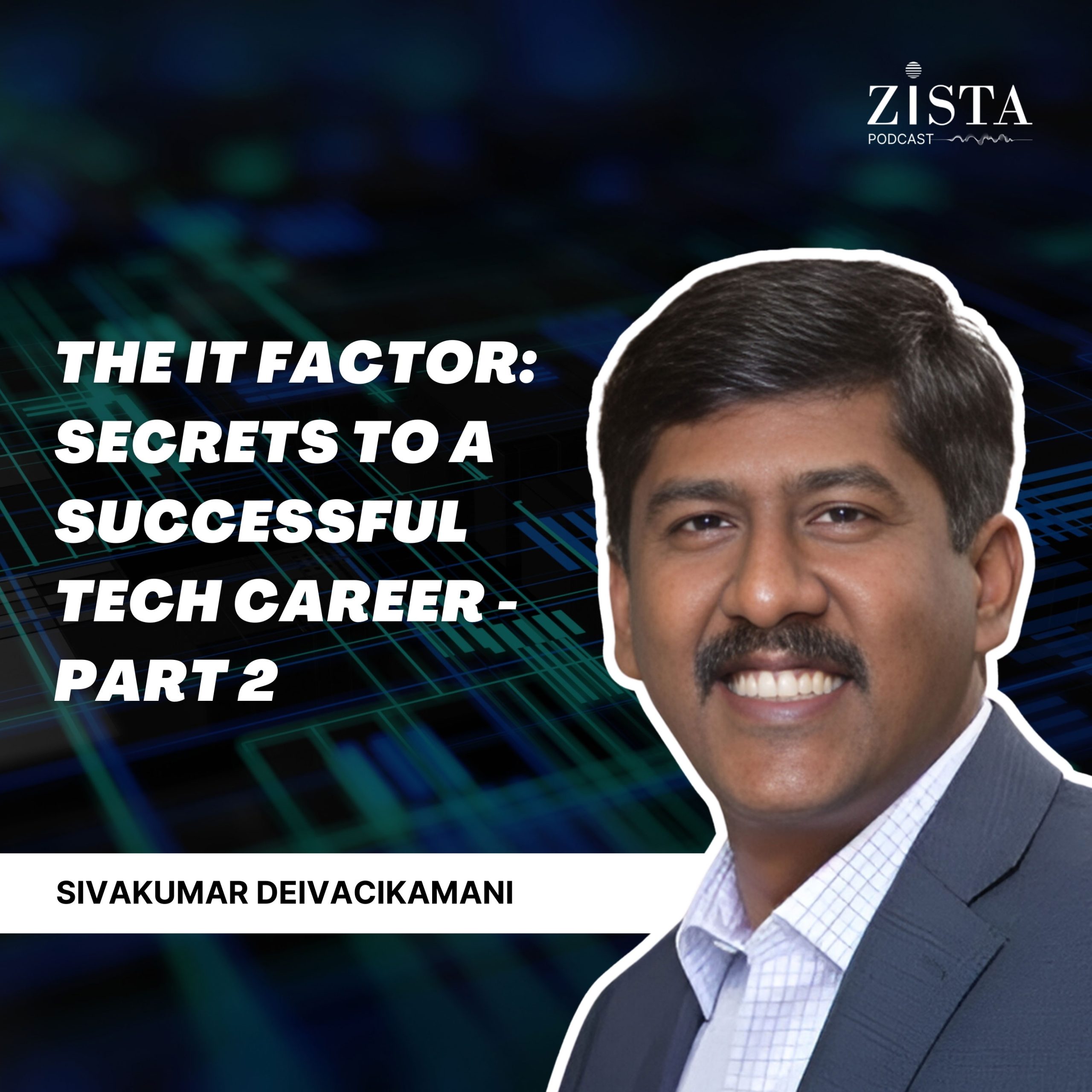The Future of Aerospace Technology and Education in India – Episode 3
In the latest episode of The Zista Podcast, Season 2, Episode 3, we explore the world of aerospace technology and education in India. Our guest, Dr. Kiran, an expert in aerospace engineering with a background that spans across India and Germany, brings invaluable insights from his time at ISRO and the Vikram Sarabhai Space Center. Now leading research at Skyroot Aerospace, he offers a wealth of knowledge on developments in the field.
Dr. Kiran shares his journey, from his academic endeavors to his work in nanocomposites, and discusses the critical roles of aerospace engineers today. Our discussion also touches on the surge of emerging technologies, particularly AI and machine learning, and their transformative impact on aerospace.
We delve into the current opportunities and gaps in the sector, providing a unique perspective for students and professionals interested in aerospace. Dr. Kiran also highlights the key skills and qualifications necessary for success in this dynamic industry.
Join us for this enlightening episode to get an expert’s view on the future of aerospace technology and education in India.
In the latest episode of The Zista Podcast, Season 2, Episode 3, we discover the fascinating world of aerospace technology and education in India. Our esteemed guest, Dr. Kiran, brings a unique perspective from his extensive experience in aerospace engineering, stretching from academic achievements in India and Germany to his pivotal role in major space organizations like ISRO and the Vikram Sarabhai Space Center.
Currently leading Research and Development at Skyroot Aerospace, Dr. Kiran shares his journey in the field, including his work on nano composites and strategic projects. Our conversation with Dr. Kiran covers various facets of aerospace engineering. We explore his personal inspirations and the drive that led him to this cutting-edge field. He sheds light on the roles and responsibilities inherent to an aerospace engineer.
Emerging technologies in aerospace are a highlight of this episode, as Dr. Kiran elaborates on innovations poised to revolutionize the sector. In an era dominated by AI and machine learning, we discuss their impact on aerospace, including their role in simulations and scenario testing.
Addressing the current landscape, Dr. Kiran identifies gaps within the aerospace sector, framing them as potential opportunities for aspiring students. Additionally, we explore the specific skills and qualifications that are essential for success in this industry.
Tune in to gain a deeper understanding of aerospace technology and education, directly from a leading expert in the field.
KEY TAKEAWAYS
- Core engineering disciplines are fundamental and more significant than AI and machine learning, which serve as supplementary tools. Understanding this balance is crucial for the education and development of future engineers.
- In the space sector, even minor errors can lead to severe consequences and substantial financial losses. Therefore, ensuring 100% reliability is crucial at every stage.
- The importance of a solid engineering foundation, enhanced by practical internship experiences like those at companies such as Skyroot, highlights the value of hands-on learning in shaping a successful career in aerospace.
- The aerospace sector’s ongoing technological advancements present vast opportunities for those informed and passionate about these developments.
- A key insight for students and graduates is the emphasis on genuine passion and interest in aerospace, beyond academic qualifications, especially in startup environments.
- The fusion of aerospace technology with other fields, like medicine, highlights the potential for innovative cross-disciplinary career paths.
QUESTIONS
Q1. How did you get inspired to choose Aerospace Engineering as your career path?
A: Dr. Kiran attributes his career choice in Aerospace Engineering to a lifelong dream, fueled further by his academic journey and professional experiences. His deep engagement with aerospace materials played a pivotal role, particularly during his tenure at the Sarabhai Space Center. This exposure not only expanded his knowledge but also significantly reinforced his resolve to excel in this field. Dr. Kiran expresses profound gratitude for these experiences, considering them a boon that has shaped his career path.
Q2. What are the key roles and responsibilities in Aerospace Engineering at Skyroot?
A: Drawing from his experiences at Skyroot, Dr. Kiran explains that this work encompasses a wide range of activities. A key focus is on developing solutions for the next generation of satellites that are emerging globally. Their primary task is to design launch vehicles that function akin to cabs, transporting customer satellites from one location to another. This process involves high customization and flexibility to meet specific satellite requirements.
An essential aspect of aerospace engineering, as Dr. Kiran emphasizes, is the unwavering commitment to reliability. In the space sector, even minor errors can lead to severe consequences and substantial financial losses. Therefore, ensuring 100% reliability is crucial at every stage.
Skyroot’s primary mission involves sending customer satellites into orbit. They have been actively developing small satellite launch vehicles. A significant achievement for Skyroot, and a source of national pride, was the successful launch of their first private launch vehicle from Sriharikota on November 18, 2022. This launch marked a historic milestone as it was the first of its kind in South Asia, completed successfully on the first attempt. This achievement is not only a testament to their team’s capabilities but also a significant motivation for the entire country, showcasing the emerging prowess of the private sector in launch vehicle technology.
Q3. What emerging technologies are set to revolutionize the Aerospace sector?
A: Dr. Kiran highlights several burgeoning technologies poised to significantly impact the aerospace industry. He notes that the aerospace sector often approaches new technologies cautiously due to the rigorous testing requirements and the paramount importance of reliability in space missions. Nonetheless, at Skyroot, they are actively embracing and integrating these emerging technologies. A key focus is on 3-D printing, which allows for the efficient creation of complex components that would be time-consuming to produce using traditional methods. Additionally, Skyroot is leveraging advanced composite technologies, further enhancing their capabilities in aerospace engineering. Their team, composed of experts in mechanical design, is instrumental in incorporating these technologies effectively, thereby aiding in the development of necessary and innovative aerospace components.
Q4. How are AI and Machine Learning utilized in Aerospace Engineering simulations and testing?
A: Dr. Kiran explores the use of AI and machine learning in the aerospace sector, especially in simulations and scenario testing. He points out that Skyroot employs a diverse team of engineers, including mechanical and aerospace experts, as well as professionals from various other engineering disciplines. The advancement in these core engineering fields plays a critical role in the development of both the aerospace sector and the broader field of space sciences. While AI and machine learning have been adopted to enhance various aspects of these core engineering disciplines, Dr. Kiran emphasizes that these advanced technologies are supplementary tools rather than primary drivers. The core engineering fields, according to him, are fundamental and hold greater importance. He believes that understanding the essential role of these traditional engineering branches, in conjunction with AI and machine learning, is crucial for future generations. This approach underlines the synergy between established engineering practices and cutting-edge technologies in advancing aerospace engineering.
Q5. What opportunities exist for students in the Aerospace sector today?
A: Dr. Kiran observes that the current aerospace sector, characterized as a deep tech hardware field, is undergoing significant disruptive technological advancements. These advancements are quietly solving complex, global challenges and fostering long-term economic growth and innovation. This evolving landscape offers numerous opportunities for aspiring scientists and engineers, particularly those who stay informed about ongoing technological progress.
However, Dr. Kiran points out a notable gap in the sector: the lack of passion among some students. While there are many deeply passionate about space and aerospace, others pursue it without genuine interest. For startups like Skyroot and others in the space industry, a candidate’s passion is a critical factor—valued not just in words but in actions and deeds. This passion drives individuals to excel and contribute meaningfully to the field.
He also highlights that India’s positioning in the G20 has garnered global attention and investment, creating further opportunities in aerospace. The fusion of technologies, such as the intersection of 3D printing with both aerospace and medicine, exemplifies new areas of innovation. This crossover between fields like medicine and mechanical engineering is generating new avenues for engagement and development, underscoring the importance of dedication and enthusiasm for students aiming to make a significant impact in aerospace.
Q6. What skills and qualifications are essential in the Aerospace industry?
A: Dr. Kiran emphasizes the importance of a strong foundation in the core branches of engineering for those aspiring to enter the aerospace industry. Beyond academic knowledge, he stresses the need for intense passion and obsession in the field. Skyroot, for example, looks for candidates who demonstrate exceptional passion and a deep-seated fascination with aerospace challenges, which is often evident in how they approach problems during interviews.
Skyroot also offers a unique pathway for aspiring aerospace professionals. They provide paid internships lasting six months, during which interns are closely evaluated. Depending on their performance, these internships can lead to regular employment. This approach underscores the company’s commitment to identifying and nurturing talent that not only has the requisite technical skills but also the drive and enthusiasm essential for success in the demanding field of aerospace. Dr.Kiran’s insights highlight the industry’s selective nature, seeking individuals who combine technical proficiency with a genuine spark and dedication to the field.




